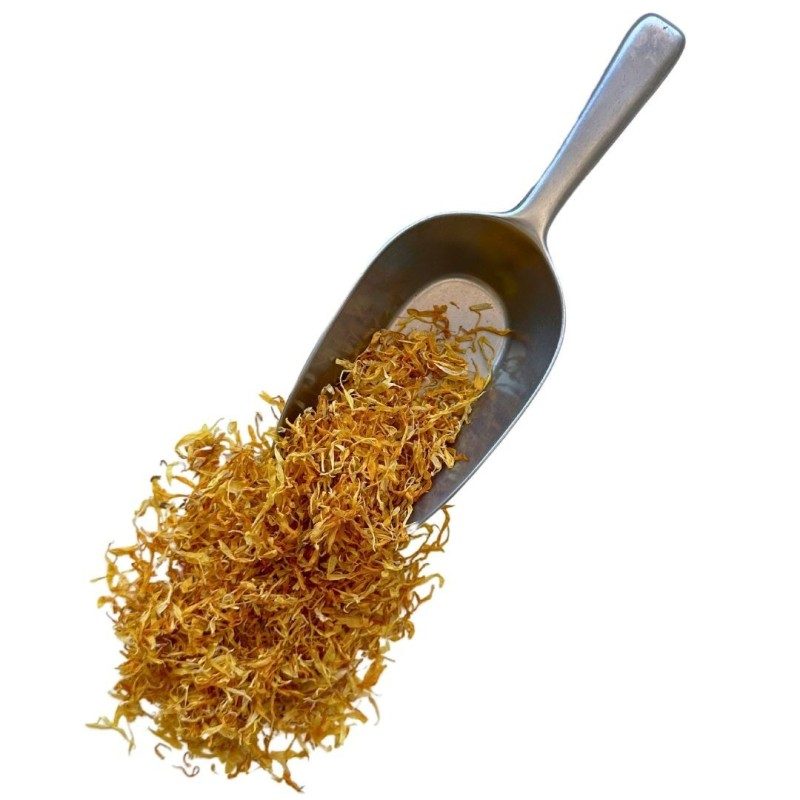








Description
This concerned petal tea is ideal for softening internal and external inflammations. A perfect choice for those looking to improve their digestive and skin health.




 Paiement 100% sécurisé
Paiement 100% sécurisé




The concern helps to reduce inflammation and promote healing thanks to its anti-inflammatory properties, ideal for general well-being.
Calendula officinalis is an annual plant belonging to the family Asteraceae. It is characterized by its bright yellow to orange flowers, which bloom from spring to autumn. The leaves are oblong and slightly hairy. The concern prefers temperate and sunny climates, and it is often cultivated in gardens for its ornamental and medicinal qualities. It thrives in well drained soils rich in organic matter. The main areas of cultivation include South Europe, North Africa and certain parts of Asia.
Calendula officinalis, commonly known as concern, is a plant with multiple virtues, used since ancient times. Originally from the Mediterranean basin, this plant was venerated by Greeks and Romans for its medicinal and cosmetic properties. Concern petals were often used to treat injuries and inflammation. In the Middle Ages, concern was also used for its culinary properties, adding a touch of colour and flavor to dishes. Today, concern is appreciated for its benefits on the skin and its soothing effect.
Data sheet
To prepare a tea of trouble petals, add a tablespoon of dried petals to a cup of boiling water. Allow infuse for 10 to 15 minutes, then filter. You can drink this herbal tea up to three times a day to enjoy its soothing and anti-inflammatory benefits. It can also be used externally to relieve skin irritation.
Although the concern is generally safe for most people, it is recommended to consult a health care professional before using, especially if you are pregnant, breastfeeding or taking medication. Some people may be allergic to concern, so it is advisable to do a skin test before topical use. Avoid using the concern in case of known allergy to plants in the family Asteraceae.
YES
No specific deadline
The concern helps to reduce inflammation and promote healing thanks to its anti-inflammatory properties, ideal for general well-being.
Calendula officinalis is an annual plant belonging to the family Asteraceae. It is characterized by its bright yellow to orange flowers, which bloom from spring to autumn. The leaves are oblong and slightly hairy. The concern prefers temperate and sunny climates, and it is often cultivated in gardens for its ornamental and medicinal qualities. It thrives in well drained soils rich in organic matter. The main areas of cultivation include South Europe, North Africa and certain parts of Asia.
Calendula officinalis, commonly known as concern, is a plant with multiple virtues, used since ancient times. Originally from the Mediterranean basin, this plant was venerated by Greeks and Romans for its medicinal and cosmetic properties. Concern petals were often used to treat injuries and inflammation. In the Middle Ages, concern was also used for its culinary properties, adding a touch of colour and flavor to dishes. Today, concern is appreciated for its benefits on the skin and its soothing effect.
Data sheet
To prepare a tea of trouble petals, add a tablespoon of dried petals to a cup of boiling water. Allow infuse for 10 to 15 minutes, then filter. You can drink this herbal tea up to three times a day to enjoy its soothing and anti-inflammatory benefits. It can also be used externally to relieve skin irritation.
Although the concern is generally safe for most people, it is recommended to consult a health care professional before using, especially if you are pregnant, breastfeeding or taking medication. Some people may be allergic to concern, so it is advisable to do a skin test before topical use. Avoid using the concern in case of known allergy to plants in the family Asteraceae.
YES
No specific deadline